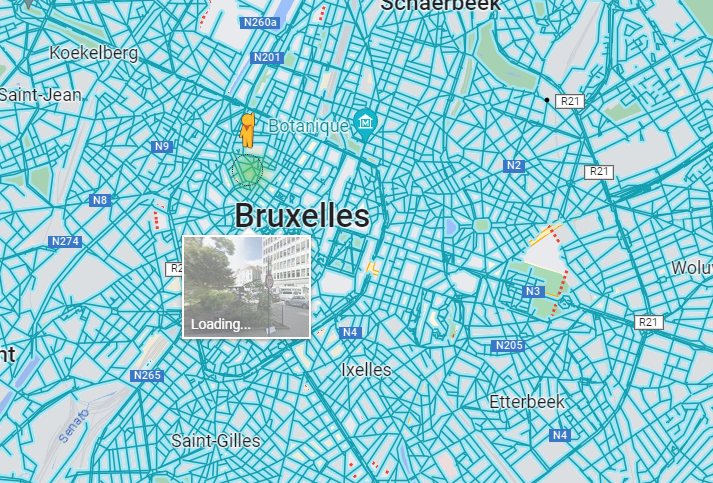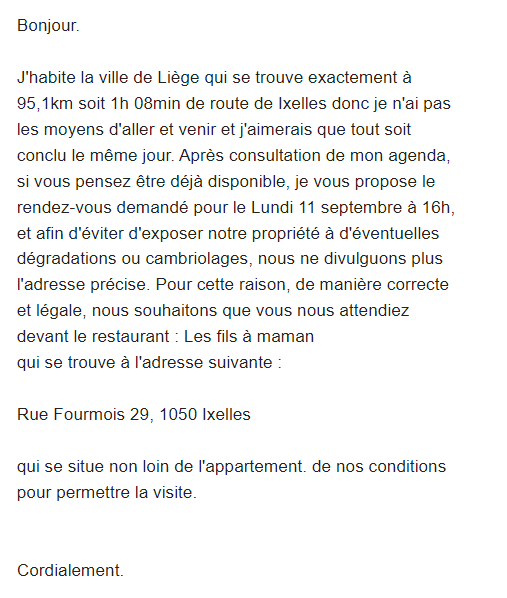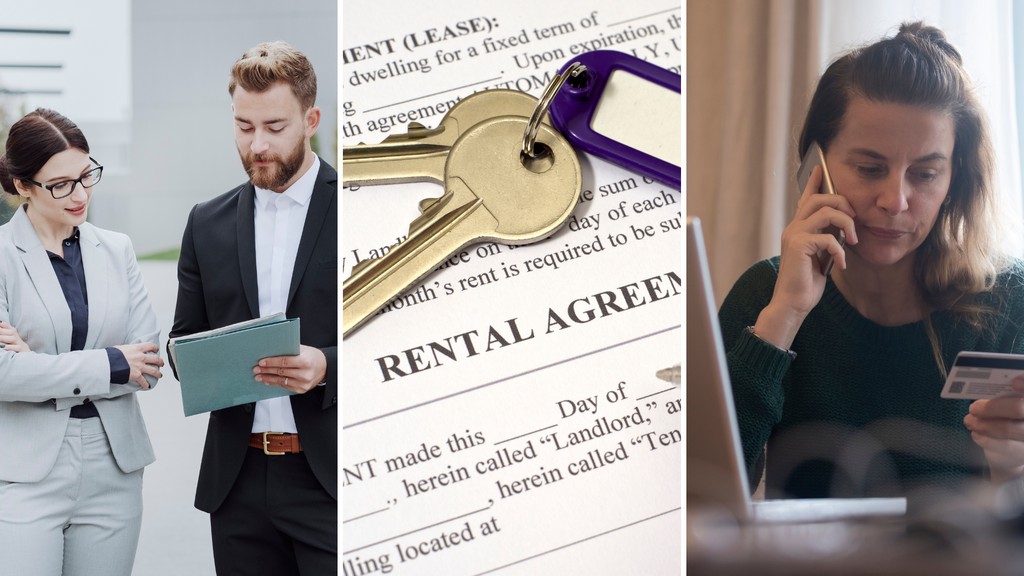As with many capital cities, Brussels is a desirable location to live in and competition is fierce for the best housing – especially at peak periods such as the start of the academic year.
Though there are gems to be found at attainable prices, the city's rental market also has its share of scams, with fraudsters often posing as landlords living abroad who need a tenant as soon as possible. In a bid to lure would-be tenants also in urgent need of housing, victims are asked to simply transfer the deposit in exchange for the apartment keys, without seeing the space in person first.
With thousands of students and interns moving in and out, Brussels has a huge housing turnover at the end of every season, which provides the perfect setting for such rental scams.
22-year-old ULB medical student Santiago Kadeyan told The Brussels Times that he spotted six such scams during his latest search for housing – three of which were emailed to him directly after he inquired about a listing. "I was already suspicious that the listing could have been a scam, and as soon as they started talking about prepaid cards, that confirmed it."
Here's how to avoid getting caught out during the already stressful housing hunt.
Visit the property in person
The best way to confirm that a listing is legitimate is by physically visiting the property and meeting the landlord in person. If the property is not directly managed by its owner there should be a certified property manager or realtor to organise visits and provide the necessary information. Remember that real landlords vet their tenants almost as much—and perhaps more—than tenants vet their landlords. It is also in their best interest to meet a potential future tenant.
If you are unable to visit a rental listing in person, you should try to get a friend to go for you. If that is also not possible you should only book rental properties that have reviews from previous tenants. This will confirm not only that the property exists but also the state it is in. Make sure to still vet the space as well as you can online, including using Google Street View.

Street view on Google.
When considering a lease, keep in mind that both the tenant and the landlord should sign the contract before the landlord requests the deposit. Any money demanded before the signing of the lease – besides application fees requested by some property management companies – could signal a scam. Large security deposits or even the first month's rent should never be sent before the signing of a lease.
If you're searching for housing on Facebook marketplace, always check the profile of the person who posted the listing and keep an eye out for any irregularities. Kadeyan listed some common red flags: profiles with the same first and last names (ex. Clémentine Clémentine), a lack of images, no signs of activity or friends and/or a very new profile.
The surest way to avoid scams is by using a real estate agent or renting from a property management company. Though more expensive than finding an apartment independently, an expert means you can be sure of avoiding even the most deceitful scams – ones that usually target unsuspecting students and interns.
Spotting red flags
Housing scams are common in the rental market and watching out for some well-known red flags can help avoid the worst of them.
First of all, be suspicious of prices that are surprisingly low. Be aware of the average rent for your ideal housing and remain wary of anything that seems far cheaper than this. "If it seems too good to be true, it is probably fake," Kadeyan confirms.
This also applies to landlords who immediately accept tenants without requesting background information. Most legitimate landlords will ask for references, a guarantor and proof of rent payment for one or more months from your previous landlord. As with Kadeyan's previous advice: if it seems too easy, it likely is.
Likewise, spelling, grammar and/or punctuation mistakes could also indicate a scam. Spacing mistakes especially could be a sign of rapid copy/pasting, which is unusual for a real landlord. If the text is messy, it could be a scam from overseas. Kadeyan also warns of landlords who post listings on housing sites but then immediately request to communicate by email (rather than the website's chat feature or by phone call).
Last but not least, scammers will try to push tenants into signing a lease or sending money as soon as possible with pressure tactics or bizarre and intimidating stories. Kadeyan notes stories of landlords claiming to be handicapped, refusing to provide an exact address or claiming that a previous tenant failed to pay the rent. Never hand over confidential information, no matter what the (potentially fake) landlord says.

Screenshot of an email received by Santiago Kadeyan with several red flags. The landlord claims to live far away, wants to sign the lease within one day and does not provide the exact address of the rental space.
Common rental scams
Here are common rental scams to watch out for while searching for housing.
Phantom rentals: listings that don't exist. Scammers will ask you to sign the lease and/or send the deposit without seeing the property first. They might say they live abroad and have to send the key by mail.
Duplicate or fake listings: duplicates of real listings with fake information or listings of real places that are not for rent. If the same property is listed in multiple places, confirm that the landlord is the same one all sites. Research the building to confirm that it is a residential space with units for rent.
Fake amenities: a real listing with additional amenities it does not have in order to raise the cost of rent. Ideally, a listing should have pictures that include all the amenities listed in the description. An easy way to avoid this is by visiting the apartment in person.
Suspicious money requests: if a landlord asks for a deposit or any form of payment before either party has signed the lease. This is a big red flag and usually signals a scam, especially if the tenant hasn't visited the apartment in person or met the landlord.
Identity theft: a listing that requests confidential information in order to steal your identity. This is potentially the most dangerous kind of housing scam. Never send personal information outside of what is required by law.
In most cases, landlords are only allowed to request a potential tenant's first and last name, a means to communicate with them, their financial details to verify that they can afford the rent, the number of people who will live on the property, documents necessary to verify the identity of the tenant and their marital status.
Related News
- Twenty untranslatable expressions that will instantly make you sound more Belgian
- Brussels among top 50 most expensive cities for expats
- Brussels Region invites expats to make their voices heard
What to do after recognizing a scam?
"I signal all scams like the ones I mentioned. If I'm bored I string them along with idiot emails where I pretend to not understand," Kadeyan admits. "This way scammers lose time, as well as the ability to scam other people."
Whether or not you choose to scam a scammer in return, all cases of fraud should be reported to the police.
Report scams
Report all suspected instances of scams and fraud to the federal police through their online form.

